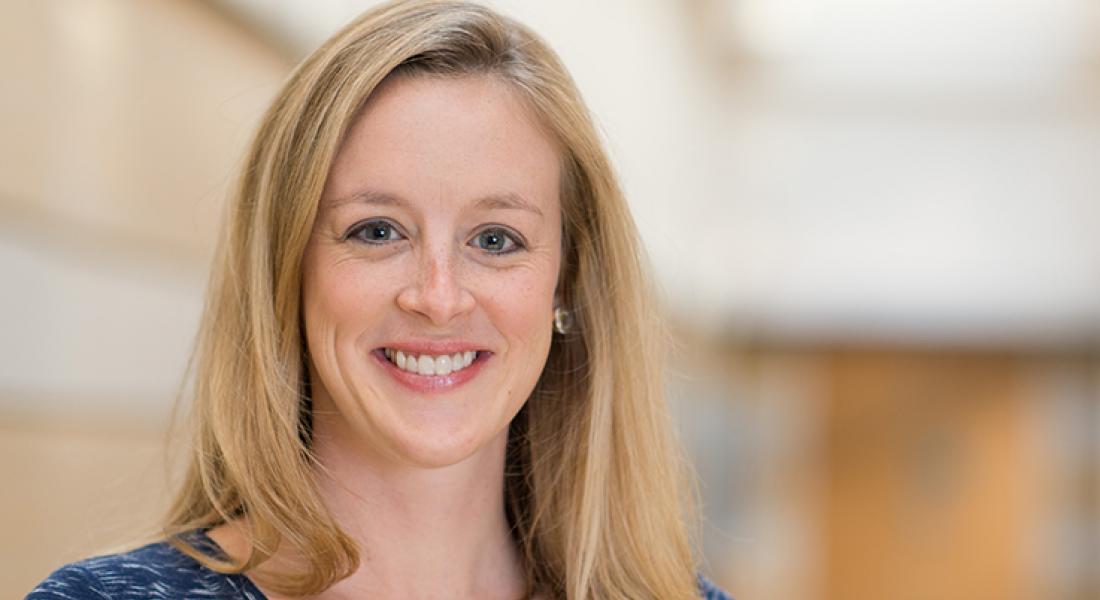
Kellogg Faculty Fellow Laura Miller-Graff and her Psychology department colleague E. Mark Cummings have developed an intervention and support program to support Palestinian families in East Jerusalem, the West Bank, and Gaza who are affected by ongoing conflict there.
The Promoting Positive Family Futures (PPFF) program includes strategies to strengthen the mental health of parents and children, and fortify emotional security and healthy communication in households.
Miller-Graff and Cummings have worked in partnership with Palestinian organizations for years to develop a program that’s sustainable and culturally and evidence-based, and now hope it can benefit families in other high-risk areas around the world.
“It started with an interest in what could be done to help children and families affected by political violence and armed conflict,” said Cummings, the William J. Shaw Center for Children and Families Professor of Psychology. “There was really no strong model for how to do that.”
Youth who encounter sociopolitical violence and trauma are at risk for significant and long-lasting repercussions, including anxiety, behavior problems, and depression. And while intervention programs for children do exist in the territory, there are few evidence-based programs that focus on families.
“What we know in settings that are conflict-affected is that everybody, the whole society, is impacted,” said Miller-Graff, an associate professor of psychology and peace studies. “And families are living together in these settings. There’s really a significant gap in comprehensive family-focused services that approach care more holistically.”
To address this critical need, the Notre Dame colleagues crafted the ground-breaking PPFF program in collaboration with the Palestinian Counseling Center/Arab Counseling Center for Education, Catholic Relief Services, Palestinian scholars, and experts in global mental health. It’s funded by a grant from the National Institute of Mental Health, and includes Notre Dame psychologist Peggy Wang and Eric Dubow (BGSU/University of Michigan) and Khalil Shikaki (Palestinian Center for Policy and Survey Research) as co-investigators.
Bolstering family and community support, the researchers said, is key to promoting healthy functioning in households exposed to conflict on multiple levels, from bombings, to movement restriction, to lack of food, clean water, and health care. Miller-Graff said it’s important to note that it’s normal for people experiencing chronic violence and injustice to be distressed.
“We have to make sure that psychological care provides support without pathologizing distress in that context,” she said, “or normalizing the violence that’s happening.”
Three hundred households – 150 in Gaza and 150 in the West Bank – will take part in the sustainable, culturally attuned, and family-based PPFF.
The 12-hour program includes one 90-minute session per week for eight weeks; six sessions will be group-based and two will be family-based. Participants will be taught basic skills of cognitive behavior therapy and communication strategies for how to engage about a variety of topics.
During group sessions, fathers will meet together in one space while mothers and children will gather together concurrently in another. That’s because in an early pilot, fathers were reluctant to participate in group sessions. When a group was created exclusively for them, engagement skyrocketed from zero to 100 percent, Cummings said.
“It truly speaks to the importance of having an iterative process that includes feedback from the key stakeholders – both practitioners and families,” said Miller-Graff, who also is director of undergraduate studies of the Kroc Institute for International Peace Studies and director of the BRAVE (Building Resilience After Violence Exposure) Research Lab.
A subsequent pilot program implemented with 68 families at the end of 2020 in Gaza City yielded promising benefits.
“In a fraction of the time, our program had just as much impact on the adolescents as those in a very strong adolescent-based program and had additional unique benefits for mothers and fathers,” said Cummings.
Adolescents in the PPFF pilot achieved comparable positive results with counterparts who took part in a longer (50-hour, 25-session), well-established, locally administered, adolescent program. Youth in both programs demonstrated significant improvement in adjustment problems, resilience and security within the family.
The PPFF program also resulted in distinct, positive outcomes for parents and family-wide adjustment. Notably, through the use of cognitive strategies, parents were better able to regulate their emotions, which was associated with lower levels of depression.
The researchers have built time into the five-year project to evaluate its effectiveness. The resulting data will guide their next steps.
If the PPFF is successful, area counseling centers and organizations could administer the program to additional families in the West Bank and Gaza, where about 5.3 million people live.
Cummings said there’s also a possibility the program could be replicated anywhere – with adjustments for cultures and norms – that is impacted by chronic violence.
There’s no shortage of possibilities; in 2022, the United Nations indicated that 2 billion people worldwide live in conflict-affected zones.
“Every context is different,” he said, “and we can adapt the program to the context.”
This story originally appeared at al.nd.edu.
The Kellogg Institute for International Studies, part of the Keough School of Global Affairs at the University of Notre Dame, is an interdisciplinary community of scholars and students from across the University and around the globe that promotes research, provides educational opportunities, and builds partnerships throughout the world on the themes of global democracy and integral human development.





